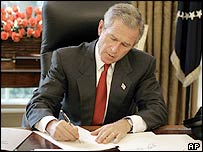
Bush promised to listen to the 9/11 report's recommendations
|
US President George W Bush has given the CIA director new powers, including some control over other intelligence agencies, the White House says.
He signed executive orders that would also launch a national counter-terrorism centre.
Spokesman Scott McClellan said the CIA chief would have temporary authority to act as national intelligence director.
But the orders do not create the post itself - a key recommendation by the independent 9/11 commission.
The announcement follows calls for an intelligence overhaul after the commission published its findings on the 11 September attacks.
Correspondents note there is also a political angle to the timing of the executive orders, which do not need Congressional approval to be implemented.
 |
EXECUTIVE ORDERS
Give CIA chief "interim" authority of intelligence tsar
Set up National Counter-Terrorism Center
Spell out guidelines for intelligence sharing
|
It is no coincidence that Mr Bush signed the presidential orders just days before a Republican Party convention in New York where national security will be a key issue, the BBC's Nick Childs in Washington says.
He says Mr Bush has been facing growing pressure to act after the independent 9/11 Commission published its recommendations earlier this year.
Both Republican and Democrats have embraced the wide-ranging recommendations of the 9/11 bipartisan commission in general, but they have been arguing about how best to implement them, analysts say.
'Protecting Americans'
Mr McClellan said at a briefing in Washington earlier on Friday the president would "sign some executive orders and issue some presidential directives that will help us take additional steps to improve our ability to find, track and stop terrorists".
He said one executive order would give acting CIA Director John McLaughlin "interim" authority to perform many of the functions of a proposed intelligence tsar in overseeing 15 intelligence agencies.
Mr McClellan said this would also include some budgetary authority, adding that President Bush would continue to work with Congress to create the position of national intelligence director.
Earlier this month Mr Bush nominated Republican Congressman Porter Goss to be the new director of the CIA, the agency that gathers foreign intelligence as opposed to the FBI with its domestic focus.
Mr Goss, who heads the House of Representatives intelligence committee, must gain Senate approval to replace George Tenet, who resigned as CIA director last month.
Mr McClellan said that another executive order would set up the National Counter-Terrorism Center, while a third order would spell out guidelines for the sharing of intelligence among agencies.
"The president is committed to doing everything in his power to make sure that we are protecting the American people," Mr McClellan said.
After the announcement, Democrat's minority leader in Congress Nancy Pelosi said in a statement: "Finally, President Bush is doing part of what the joint inquiry of the congressional intelligence committees and the 9/11 commission have long recommended. But more must be done."
9/11 report
Last month, the 9/11 commission blamed US leaders for failing to comprehend the gravity of the threat posed by al-Qaeda and failing to avert the 2001 attacks.
Chairman Thomas Kean spoke of a failure of "policy, management, capability and, above all, imagination".
The commission recommended a wide-ranging overhaul of US intelligence services and congressional oversight.
Earlier this week, Senate intelligence committee chairman Pat Roberts proposed to break up the CIA as part of a general intelligence overhaul.
About 3,000 people died when the hijacked airliners were crashed in New York, Washington and Pennsylvania on 11 September 2001.

